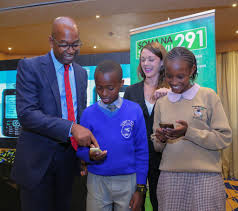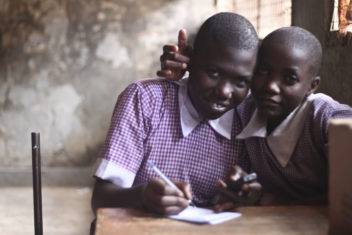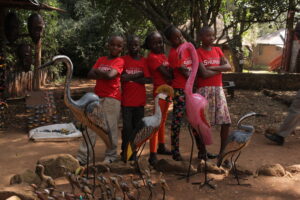MPrep (now Eneza Education), was founded in 2011 by Kenyan teachers and educators keen on making technology useful for their students. The idea came about due to a lack of quality engaging revision material for students in rural areas where textbooks are expensive and obviously non-interactive.
Co-Founders
Toni Maraviglia, one of our co-founders was a teacher who spent her initial time, in Kenya in a rural village, for a year. During her stay in Muhuru Bay, she taught students and teachers as part of a programme with the non-profit WISERBridge. Her students had no library where they could conduct their research so she would engage her students with a system of revision flashcards which promoted great peer learning and collaboration among learners and teachers. Despite this method, it was hard to ensure everyone participated in this system. One student, Daniel in class 7 failed his KCPE exams despite the tutoring and tools he had access to from the programme.

Eneza Education: Shupavu291 Launch- from left to right (Safaricom’s CEO, Bob Collymore, three pupils using Shupavu291, Toni Maraviglia, Kago Kagichiri & Caroline Mutoko.
Kago Kagichiri, our other co-founder developed his first mobile chat room at the age of 14. He took an unpaid staff position as supervisor of the computer lab while in high school at Starehe Boys’ Centre & School. Kago joined Jomo Kenyatta University of Science and Technology and was a top student in his degree for two years running. He felt trapped by a system that seemed to promote rote learning even at the university level and held him back “from acquiring more knowledge”, and so dropped out in his second year.
In October 2011, Kago & Toni met through the iHub, one of Africa’s first tech hubs in Nairobi. They co-founded MPrep. Toni’s teaching experience and love for the classroom, together with Kago’s love for technology and acquiring practical knowledge, allowed them to develop content aligned lessons and assessments on mobile phones, delivered by SMS (text message), to help students learn even in the most marginalized areas of Africa.
In 2012, mobile penetration in Kenya was 69% according to GSMA Sub-Saharan Africa Mobile Observatory 2012. One common thing that was available even in the rural village were mobile phones. Toni conducted a survey in which 90% of the children at Mahuru Bay, despite a lack of electricity for all, had access to a mobile phone.
Our co-founders were brought together by a belief that all children are entitled to equal access to affordable education. SMS was the best way to provide literacy to learners at scale. It made sense to use the readily available simple technology – these mobile “dumb” phones- to give access to localized learning content aligned to the national curriculum. Eneza continued to prove the value proposition for SMS based, bite-sized lessons, assessments and real-time feedback through their study tool.

Eneza Education Shupavu291 Launch: Safaricom CEO, Bob Collymore, Toni Maraviglia & two pupils from Milimani Primary School.
The content on the platform was developed by the collaboration of practicing teachers from all over Kenya to create the content for Eneza’s initial Class 7 and Class 8 study tool. In mid-2012, they partnered with Safaricom to deliver a low-cost solution where students paid a fraction of the cost for SMS messages to access learning. They also provided data to parents and teachers for purposes of monitoring student performance. This mutually beneficial partnership allowed Eneza to revise their mission to Making 50 million rural kids in Africa smarter.
Impact study
In 2013, Eneza implemented an internal 3-month long impact study among pilot schools showed an improvement of at least 15% compared to the previous year. They learned that the platform fostered more confidence, knowledge retention and collaborative learning among students where some used the same phone to study in groups. Students studied more thanks to Eneza Education.
The number of students learning on the platform grew rapidly but because they were still being charged per SMS, students who had high engagement couldn’t afford the platform. In 2014, Eneza Education created a new product with Safaricom, Kenya’s largest telecommunication network to provide learning at a fixed weekly cost of $0.10 to access unlimited messages and content for 7 days. At the same time, the SMS/USSD study tool was rebranded to Shupavu291 (‘shupavu’ means champion).
Apart from providing learning content through SMS/USSD, Eneza Education also provided multi-device learning platforms like the desktop web, mobile web, Android app and chatbots (Whatsapp and Facebook Messenger) to diversify accessibility to different learners, even though 99% of users still access Shupavu291 via SMS (text message).
Incubations & Investments
At inception, Eneza was part of the first cohort of startups that were incubated at the Nailab, a business incubator offering an entrepreneurship programme focusing on growing technology-driven ideas. Eneza has since got leadership and growth support from prestigious fellowships like Echoing Green, The Unreasonable Institute, Girl Effect Accelerator, and Bluhm Helfand Social Innovation (BHSI).
Eneza Education has enabled students like Imelda, Erastus, Maclus, and Isaiah to access affordable study material through simple phones. With over 4.9 Million learners, Eneza is now the largest virtual classroom in Africa. In March 2018, Shupavu291 was the best mobile innovation for education in the Global Mobile Awards.
CEOs
Toni was CEO of Eneza Education until 2016 when she relocated to the United States and handed over the role to Kago, her co-founder and CTO.
Kago then led Eneza Education till October 2018, when he transitioned to board member role. He was always passionate about coding and this transition allowed him to explore solving other problems in Africa. Munyutu Waigi took over as Interim Chief Executive Officer in October 2018 to January 2019.
Wambura Kimunyu, our new CEO joined us in February 2019. With ten years experience in the Pan Africa tech space, she brings the skills needed to take Eneza Education to the next level. Wambura, who has a degree in education, has worked in publishing, premium mobile services as well as FinTech and has developed a deep understanding of the bottom of the pyramid (BOP) and mass markets both in Kenya and across Africa.


